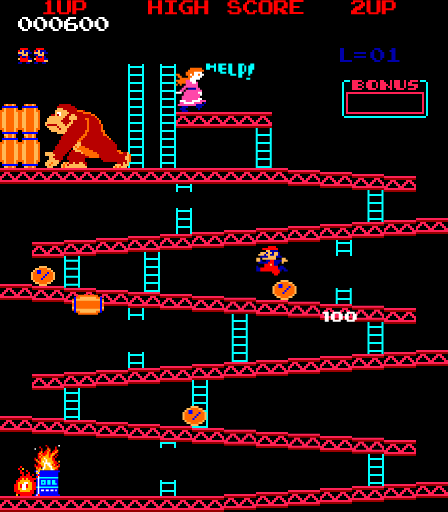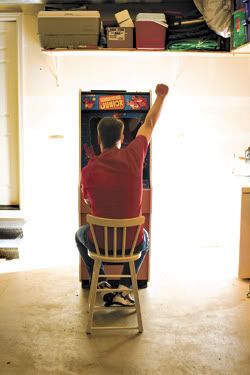
Ali vs Frazier. Bird vs Magic. Borg vs McEnroe. Wiebe vs Mitchell. Of all the great rivalries of sport, it is arguably the latter that best defines the American experience, despite being the least recognized, as well as the only one that did not actually involve head-to-head competition. But don’t be distracted by the absence of a field, rink, or stadium, or even a blood-filled trench of athletic endeavor, because these two men, far, far away from arenas packed with roaring crowds, did battle in garages, basements, and lonely arcades, where only the nerdy and nostalgic do not fear to tread.
The game is Donkey Kong, the warfare is real, and by the end, we have witnessed a film with as many twists and turns as the boldest fiction, with heroes atop noble steeds and dastardly evildoers in black hats to match. Seth Gordon’s The King of Kong: A Fistful of Quarters travels through these minefields of obsession, compulsion, arrogance, and unholy competition, but above all, takes the lives of two men — Steve Wiebe and Billy Mitchell — and the classic video game that has consumed each for the better part of the past quarter-century. It is a heartfelt, unflinching look at a bizarre, almost grotesque subculture, but more than that, it channels the drive to escape anonymity and mediocrity that afflicts high and low alike.
And while we might recoil in horror at the utter seriousness by which these gamers live out their days, it is impossible not to end the screening in hysterics. Above all, this is a riotous, supremely entertaining work, and through style, music (Leonard Cohen has never seemed more appropriate), personality, and the complete absence of condescension, it becomes one of the best films of the year.
Sure, it’s all too easy to stand in judgment of these tragic figures of the modern age: cursed with bad haircuts, inflated (and unjustified) egos, self-doubt, and an astonishing lack of perspective, Wiebe, Mitchell, and the supporting clowns who pepper the sidelines are striking examples of what can happen to anyone so lacking in basic social skills that the comings and goings of a fantasy world become indistinguishable from workaday reality. The world is on fire with hypocrisy and waste, and you’re spending a dozen hours each day dodging animated barrels and fireballs? And yet, it is that very thing that makes a film like this so appealing.
We all have our interests, hobbies, and private desires, but what pushes a human being towards total immersion? When does a casual interest become a full-blown way of life? When does a man decide, for example, to ignore his job, family, and personal hygiene to master an oversized box of flashing colors and bleeps? The answers, of course, depend on the source, but for Mr. Mitchell, a devil in blue jeans who just might be Gregg Allman were he dipped in a vat of ink, it might be impossible to find a genuine starting point. It’s quite easy to believe this man was born outgunning lesser mortals, as you’re unlikely to ever cross another human being so in love with his own alleged brilliance. He’s a hillbilly madman, the Hitler of the joystick set, and every time we see him, he’s either puffing up his own accomplishments or putting down a perceived lack in others. To hear him speak, one would think he was in politics or even an activity of some import, but it’s always, always nothing more than that old game with a big ape, an ugly damsel, and a crude Italian stereotype.

Wiebe, who is the classic hero of the piece, is no less strange, but as he’s humble, decent, and likable, there’s not the same murderous rage we feel whenever Mitchell makes an appearance. Whereas Mitchell owns a few restaurants, heads a hot sauce empire, and struts about with a whorish wife straight from the wrinkled pages of Hustler, Wiebe is a teacher by trade (after being laid off from Boeing) who is married to a normal woman, has normal kids, and actually has friends who speak in his favor, rather than from the shadows. Sure, Wiebe weeps like a grandmother at odd moments, and has clearly ceded all authority to the world’s most patient spouse, but he’s a genuine fan of the game, in addition to a committed nutcase.
Even when he watch him ignore his children (one screams from upstairs that he needs his ass wiped; dad is not impressed), he’s so damned affable that we laugh along with his pursuit. The big stink really begins, though, when he breaks Mitchell’s long-held Donkey Kong mark. Trouble is, the feat had no witnesses, and is based solely on a home video of the event. Normally this would suffice — the official record keeper is an organization called Twin Galaxies, an outfit whose commitment and seriousness rank somewhere between the National Archives and the CIA — but a dedicated few (minions of Mitchell, needless to say) cried foul, and actually broke into Wiebe’s garage to take apart the suspicious machine. The record simply didn’t take, and Wiebe dedicated the next portion of his life to establishing a genuine, fully endorsed high score. Meanwhile, Mitchell waited in the wings with a tape of his own, needing only the right time to release it.
Wiebe flies across the country to New Hampshire to visit the Fun Spot, a “sanctioned” arcade that would hopefully eliminate all forms of controversy. Perhaps if he could break the record in front of a crowd, the satisfaction Wiebe so desperately craves would be his at last. He also hopes that Mitchell will make an appearance and meet the challenge head on, but he’s nowhere to be found. Interestingly, it is at this time that we learn Mitchell has never played “live” since his 1982 feat (and spread for Life magazine), and even his wife attests to the avoidance of actual competition. In other words, Mitchell is the classic bully — talking tough and coasting on reputation alone, he shirks actual engagement out of a pathological fear of failure.
The specter of Mitchell haunts the Fun Spot, though he is briefed on the telephone by his chief lackey, the truly horrifying Brian Kuh, a man so unnerving we half expect him to have Wiebe killed. Still, Kuh does have a great moment when he strolls around the arcade informing players that, because Steve is reaching the holy grail of the game, the “kill screen” will soon appear, a feat surrounded by so much myth and mystery that we expect (and get) hushed tones. But Wiebe does in fact push the machine past its breaking point, and he can go no further. And given the Fun Spot’s packed house, little doubt remains. Even the industry’s top referee, Walter Day (yes, apparently they have such people hanging around), is on hand for the special moment, and a sense of relief washes over the young teacher’s face. But then there’s that strange package from Billy; a tape so important that its handler is instructed to lay down his own life to ensure its survival. It appears Wiebe’s record is short-lived.

Worst Gaming Cheater Ever, and a real Creep
The tape is popped in for the crowd that has gathered around, and before their eyes, they witness a magnificent achievement: a Donkey Kong score that has surpassed one million. Is it possible? The tape contains odd glitches and some dubious edits, but it receives the gold standard from Twin Galaxies, and the Guinness Book of World Records is notified. Steve doesn’t see the tape first-hand (he is told that the screening was a single event, never again to be seen by the eyes of man), but since the movie audience is privileged to witness a few clips, it does in fact appear to be of questionable origins. Why the tracking issues?
An expert in such matters (self-appointed, no doubt, but there he is) says it is obvious that the game was filmed over many days and spliced together to provide the illusion of a single sitting, and he just might be right. With Billy scheming behind the scenes, can anything he touches ever really be trusted? Here’s a man who openly declares his lifelong avoidance of failure (“I ought to try it some time”, he smirks), believing that he’s destined to control his corner of the universe. But why the tapes? Why can’t he meet on the field of honor just once? After a litany of excuses, it appears that the only solution is to secure a battle on Billy’s home turf near Hollywood, Florida. At least then, he won’t be able to say that he couldn’t find the time.
Steve travels to the Sunshine State for the big meeting, but once again, Billy is impossible to locate. As time is running out, tempers flare, tears flow, and anxious nerds pace the sticky floors with sweaty anticipation. Suddenly, as Wiebe tackles yet another game, Mitchell shows up like a rock star with an entourage. He works the room, shakes a few hands, and wanders over to Steve, quickly dismissing him with a nasty remark. His big-chested wife also throws in a scowl for good measure. Billy walks a bit more, pausing only to sign a few autographs, and leaves as quickly as he came. No game, no challenge, no demonstration of his abilities whatsoever. It’s the biggest letdown in the history of the sport, and it acts as a body blow to the already teetering Wiebe. In Mitchell’s mind, this Wiebe fella is a pathetic newcomer; a pretender to the throne who doesn’t deserve to be ranked with the best of all time.
Donkey Kong is Billy’s personal playground, and he’ll stay on top no matter what the cost. Only he knows for certain if he’s cheated, but I doubt even a confirmation would set him back. If he loses this honor — the defining element of his adult life — he’ll be forced to examine the very nature of his identity. The same holds true for Steve, but he’s actually going to play to get back what he feels is his due. Billy, on the other hand, is content to use fear, intimidation, and well-coifed muscle to shape the industry to his liking. That his mania is related to video games is beside the point. Just win, baby, even if no one’s paying attention. It’s the mantra of the damned.

As much as Billy inhales the surroundings with his greed and juvenile vanity, the supporting cast leaves an equally vivid impression. What can we say about Roy “Mr. Awesome” Shildt, a Missile Command freak (and record-holder) who not only works behind the scenes to hurt Mitchell, but also submits videos of Patton parodies, wherein he unlocks the secrets of getting pussy? His own personal success with the method goes strangely unrecorded. Or Robert Mruczek, a Twin Galaxies employee so devoted that his abode threatens to be taken over by unwatched tapes of fellow gamers and their personal record-setting experiences? Or Doris Self, an elderly woman who, rather than settle into her golden years, has found new life trying to fortify her mark as the world’s Q-Bert champion? Even Steve’s daughter steps into the act, providing one of the most insightful comments of the movie as she questions why anyone would ruin their life over an appearance in the holy book of Guinness.
It’s a query he’s not prepared to answer, and I imagine everyone we meet in the course of this documentary wouldn’t even hazard a guess. The truth lies somewhere between mental illness and meaning, the quest for immortality and the dread that accompanies a life on the margins. Yes, these people are geeks, buffoons, fools, and tragic figures, and it does well to mock them, but what of the lives we lead? If called upon to account for our every hour, who among us would pass the sniff test of sainthood, or even mere sanity? At the very least, the games these people play require a tremendous amount of skill, and cannot be dismissed as mere trifles. If you remain doubtful, plunk down a few coins and play Donkey Kong again, or even for the first time. If being the best at something is enough, then distinctions are meaningless. If we classify and rank, reserving our applause solely for the vital or the relevant, then we risk becoming tedious and dull. Our world can accommodate four-minute miles, round trips to the moon, gene splicing, and yes, even arcade game mastery. As terrifying as someone like Billy Mitchell may appear, I fear more the man who would insist we’re better off without him.